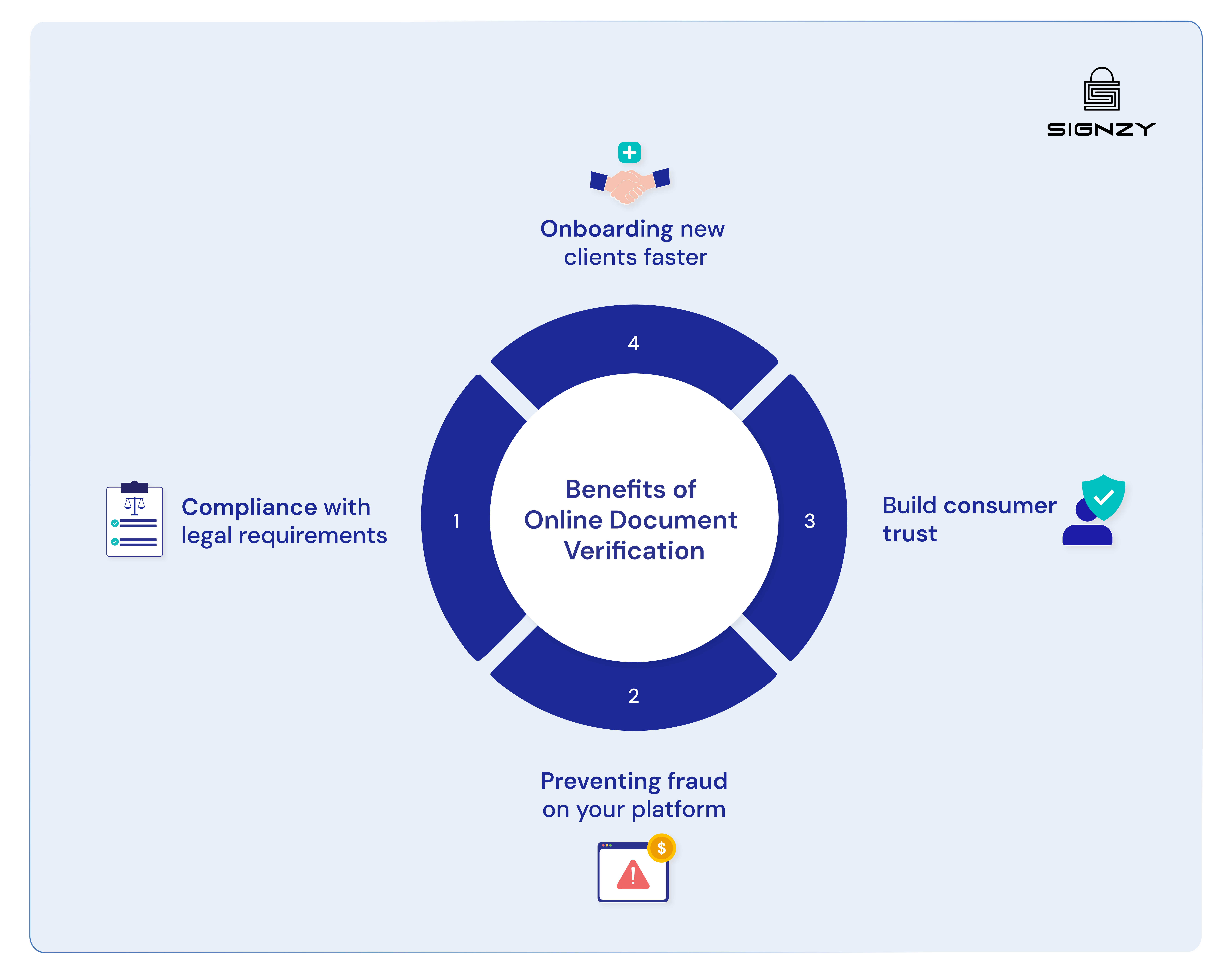What is Document Verification? How it works and key benefits
- Document verification checks the authenticity of identity documents like passports, licenses, and certificates.
- The process uses OCR, AI, and fraud detection to extract data and validate document legitimacy.
- It helps businesses prevent identity fraud and speed up digital onboarding.
- Document verification ensures compliance with KYC and AML regulations.
- Key benefits include faster verification, reduced manual errors, and improved trust and security.
As digital communication is on the rise, verifying the legitimacy of a document being scanned, emailed, or sent online has become important. Document verification services employ protocols and procedures to evaluate whether a document is real.
What is document verification?
The document verification process defines the steps of recognizing documents and ensuring their legitimacy. Depending on the situation, such documents may vary from notarized documents to personal or professional ID cards, contractual agreements to passports. Document verification is an important part of KYC compliance.
While the process can appear tiresome, its relevance remains high, especially with the pace of technological improvements and rising cybercrime. AI-driven technology, for example, can generate deep fakes and lead to illegal activities using personal and sensitive data of an individual or critical data of an organization. Document verification is necessary with identity-related paperwork such as passports, licenses, and other important documents.
During KYC compliance, document verification reduces these risks and provides a more secure experience for all end users.
Online document verification is an improvement on the existing methods of physically verifying paperwork. It allows businesses to review and verify their users’ information from anywhere.
Why is document verification important?
Without proper verification measures, fake or stolen documents can be used to open an account(s). Document verification helps in catching forgeries and reducing fraud.
Based on an Internet Crime Complaint Centre (IC3) report, the number of identity theft complaints has gone down from 27,922 to 19,778. However, based on the same report, the amount of losses reported due to identity theft still stands at $126.2 million.
Incorporating document verification into their KYC compliance processes can help businesses lower the risk of fraud and ensure the security of their operations.
Organizations must consider incorporating this process into their KYC compliance efforts to lower the risk of fraud while still ensuring the security of their operations. Businesses can confirm the legitimacy of a person’s identity by verifying identity documents such as ID cards, passports, social security numbers, and other official documents.
When sensitive information is at risk, document verification takes a high priority. Here’s a list of businesses that need to have proper document verification methods in place:
- Financial Institutions and Banks: Document verification is an important step in the KYC process during client onboarding for financial institutions like banks, credit unions, and more. It ensures that the customers are who they say they are when opening accounts or applying for credit.
- Healthcare: The healthcare industry uses document verification to verify the identity of a patient and ensure that the appropriate individual receives the right treatment.
- E-commerce: Online marketplaces employ document verification to affirm the sellers’ and purchasers’ identities. This helps in preventing fraudulent transactions as confirmed identities.
- Gaming and Gambling: Document verification is used in online gaming and gambling to verify age and comply with regulatory laws. Users are required to provide proof of age documents, such as a driver’s license or another form of government-issued ID card, during the registration process.
Physical document verification vs. digital document verification
Physical document verification is an older technique in which an individual’s identification and supporting documents are verified in person. This process requires a face-to-face meeting and a manual check of printed documents to ensure their validity and authenticity.
Although this method has a long history, it is time-consuming, susceptible to human error, and less secure due to the possibility of getting lost, theft, or forgery.
In contrast, digital document verification employs electronic methods such as document scanning and the use of document verification software. The benefits are obvious: it is faster, more precise, and secure. In a research conducted by RegulaForensics, 65% of the respondents to their survey preferred digital document verification as their identity verification method.
Businesses and individuals are increasingly turning to digital verification solutions to ensure a higher degree of security and efficiency.
Benefits of online document verification
Online document verification can provide significant benefits to your organization. Some of the benefits have been highlighted below:

- Compliance with legal requirements: Depending on the industry in which your organization works, you may be obligated by law to verify new users’ identities. Document verification is a widely acknowledged and extremely successful method of ensuring legal KYC compliance.
- Preventing fraud on your platform: Even if you are not required by law to verify user identity, doing so can help you reduce the occurrence of identity theft and other types of fraud on your platform (such as account creation fraud).
- Build consumer trust: Integrating identity verification (in its different forms) into your onboarding process can go a long way toward increasing customer trust in your company or platform. Since all the users complete the same verification, bad actors will find it far more difficult to get through and wreak harm.
- Onboarding new clients faster: When combined with automation, online document verification can be accomplished in seconds in many circumstances. This is far faster than manual review, which might take minutes or days depending on the techniques utilized.
Signzy’s Document Verification APIs
Document verification is an important part of customer identity verification, and it also serves as an integral part of the KYC process. As digitization gains greater traction, the document verification process has also moved online. Therefore businesses need to update their verification standards to allow ease of use for customers.
In the modern business environment, Passport verification, Social Security Number (SSN) verification, and Driver’s License (DL) verification are some of the most commonly used identity verification methods. Signzy offers a vast toolkit of APIs to help businesses move to or improve their online document verification standards.
- Document verification is an important part of identity authentication. With increasing technological advances, document verification needs to stay up to date with developing standards.
- Regulatory norms make it compulsory for businesses like casinos, gaming websites, banks, and more to verify the identity of their customers.
- Online document verification removes geographical limitations from the identity authentication process. This allows businesses to verify the identities of their customers from anywhere in the world.
FAQ
How long does document verification take?
Why do certain documents not get approved for verification?

Saurin Parikh
Saurin is a Sales & Growth Leader at Signzy with deep expertise in digital onboarding, KYC/KYB, crypto compliance, and RegTech. With over a decade of professional experience across sales, strategy, and operations, he’s known for driving global expansions, building strategic partnerships, and leading cross-functional teams to scale secure, AI-powered fintech infrastructure.


